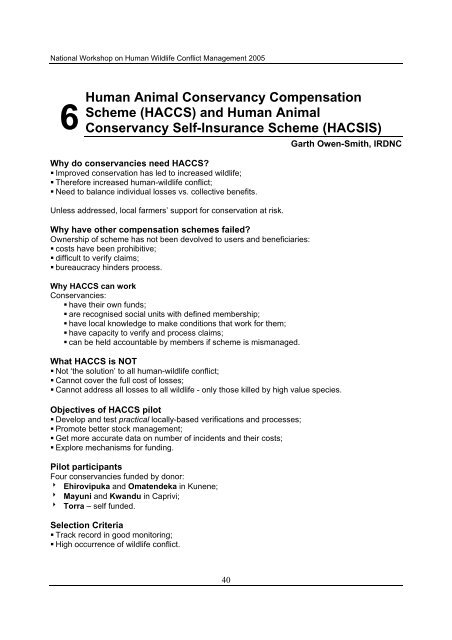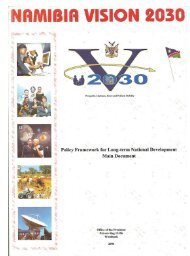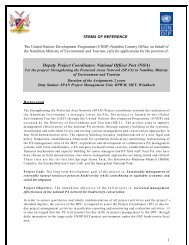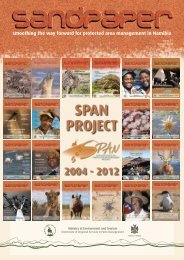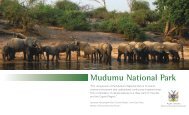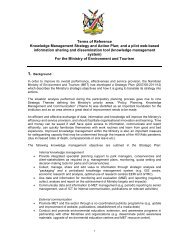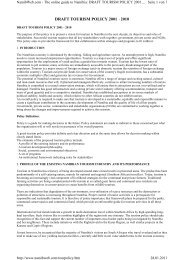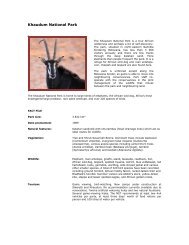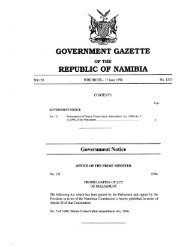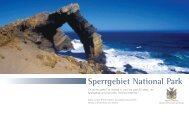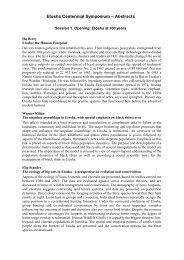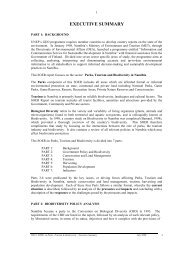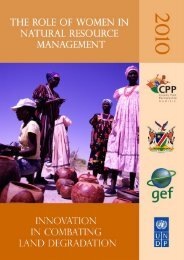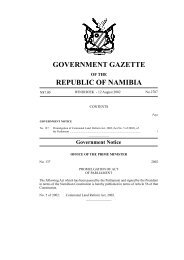HWCM - Ministry of Environment and Tourism
HWCM - Ministry of Environment and Tourism
HWCM - Ministry of Environment and Tourism
Create successful ePaper yourself
Turn your PDF publications into a flip-book with our unique Google optimized e-Paper software.
National Workshop on Human Wildlife Conflict Management 2005<br />
6<br />
Human Animal Conservancy Compensation<br />
Scheme (HACCS) <strong>and</strong> Human Animal<br />
Conservancy Self-Insurance Scheme (HACSIS)<br />
Garth Owen-Smith, IRDNC<br />
Why do conservancies need HACCS<br />
• Improved conservation has led to increased wildlife;<br />
• Therefore increased human-wildlife conflict;<br />
• Need to balance individual losses vs. collective benefits.<br />
Unless addressed, local farmers’ support for conservation at risk.<br />
Why have other compensation schemes failed<br />
Ownership <strong>of</strong> scheme has not been devolved to users <strong>and</strong> beneficiaries:<br />
• costs have been prohibitive;<br />
• difficult to verify claims;<br />
• bureaucracy hinders process.<br />
Why HACCS can work<br />
Conservancies:<br />
• have their own funds;<br />
• are recognised social units with defined membership;<br />
• have local knowledge to make conditions that work for them;<br />
• have capacity to verify <strong>and</strong> process claims;<br />
• can be held accountable by members if scheme is mismanaged.<br />
What HACCS is NOT<br />
• Not ‘the solution’ to all human-wildlife conflict;<br />
• Cannot cover the full cost <strong>of</strong> losses;<br />
• Cannot address all losses to all wildlife - only those killed by high value species.<br />
Objectives <strong>of</strong> HACCS pilot<br />
• Develop <strong>and</strong> test practical locally-based verifications <strong>and</strong> processes;<br />
• Promote better stock management;<br />
• Get more accurate data on number <strong>of</strong> incidents <strong>and</strong> their costs;<br />
• Explore mechanisms for funding.<br />
Pilot participants<br />
Four conservancies funded by donor:<br />
8 Ehirovipuka <strong>and</strong> Omatendeka in Kunene;<br />
8 Mayuni <strong>and</strong> Kw<strong>and</strong>u in Caprivi;<br />
8 Torra – self funded.<br />
Selection Criteria<br />
• Track record in good monitoring;<br />
• High occurrence <strong>of</strong> wildlife conflict.<br />
40


